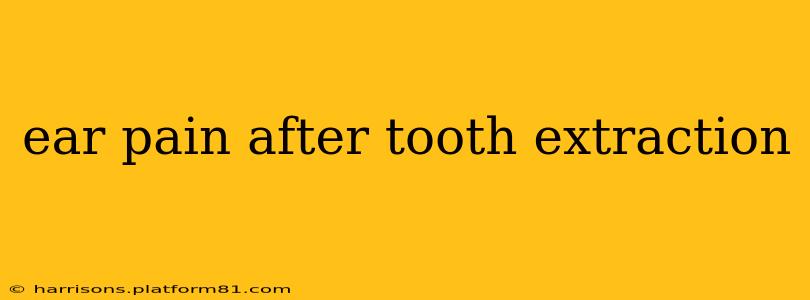Experiencing ear pain after a tooth extraction is a common occurrence, often leaving patients worried and uncomfortable. While it's not always a cause for alarm, understanding the reasons behind this pain and knowing when to seek professional help is crucial for a speedy recovery. This comprehensive guide explores the connection between tooth extraction and ear pain, providing you with the knowledge to manage this discomfort effectively.
Why Does My Ear Hurt After a Tooth Extraction?
The proximity of teeth to the ear explains why pain can radiate. Your jawbone, nerves, and sinuses are all interconnected, so inflammation or irritation near the extraction site can easily trigger pain in your ear. Several factors contribute to this referred pain:
- Inflammation: Post-extraction inflammation is normal. However, significant swelling can put pressure on the nerves and structures connecting your jaw and ear, leading to pain.
- Nerve Irritation: The nerves in your jaw are intricately linked. Damage or irritation to these nerves during the extraction process can result in referred pain in the ear.
- Sinus Infection: Upper teeth are closely associated with the maxillary sinuses. An infection in this area, sometimes triggered by the extraction, can cause pressure and pain that radiates to the ear.
- Dry Socket: A dry socket (alveolar osteitis) is a painful complication where the blood clot protecting the extraction site dislodges. This can lead to exposed bone, causing significant pain that might extend to the ear.
- Referred Pain: Pain signals from one area of the body can be felt in another. The trigeminal nerve, which innervates the face and jaw, is a major player in this phenomenon.
How Long Does Ear Pain After Tooth Extraction Last?
The duration of ear pain varies considerably depending on the individual and the underlying cause. For most people, the pain subsides within a few days as the inflammation reduces. However, persistent or worsening ear pain warrants immediate medical attention. Generally, you should expect a gradual decrease in pain within the first week. If it persists longer, consult your dentist.
What Can I Do to Relieve Ear Pain After a Tooth Extraction?
Several self-care measures can effectively alleviate ear pain after a tooth extraction:
- Over-the-Counter Pain Relievers: Ibuprofen or acetaminophen can effectively manage pain and reduce inflammation. Always follow the dosage instructions on the packaging.
- Ice Packs: Applying ice packs to the affected area for 15-20 minutes at a time can help reduce swelling and alleviate pain.
- Rest: Adequate rest allows your body to heal more efficiently and reduces discomfort.
- Gentle Warm Compress (After Initial Swelling): Once the initial swelling subsides, a warm compress can help promote blood flow and healing.
- Avoid Smoking and Alcohol: These substances can hinder the healing process and increase the risk of complications.
- Maintain Good Oral Hygiene: Gentle rinsing with salt water can help keep the extraction site clean and reduce the risk of infection. Avoid vigorous rinsing or touching the site.
Is Ear Pain After Tooth Extraction a Sign of Infection?
While ear pain is often a symptom of local irritation, it can also indicate an infection. Signs of infection include:
- Increased pain: Pain that intensifies rather than subsides.
- Swelling: Significant swelling in the jaw or cheek.
- Fever: A temperature above 100.4°F (38°C).
- Pus: Discharge of pus from the extraction site.
- Redness: Redness or inflammation around the extraction site that spreads.
If you experience any of these symptoms, contact your dentist or oral surgeon immediately.
When Should I See a Dentist After a Tooth Extraction?
Seek immediate dental attention if:
- Your ear pain is severe and doesn't respond to over-the-counter pain relievers.
- You experience signs of infection.
- The pain worsens or persists for more than a week.
- You develop a fever.
- You notice excessive bleeding or swelling.
Can I Prevent Ear Pain After Tooth Extraction?
While not all cases are preventable, following your dentist's post-operative instructions carefully can significantly reduce the risk of complications:
- Follow prescribed medication regimen: Take all prescribed antibiotics or pain relievers as directed.
- Maintain excellent oral hygiene: Gently clean your mouth as directed to prevent infection.
- Avoid strenuous activity: Rest and allow your body to heal properly.
- Eat soft foods: Avoid hard foods that could irritate the extraction site.
This information is for general knowledge and does not constitute medical advice. Always consult your dentist or oral surgeon for any concerns regarding your oral health. They can properly diagnose and treat any issues you are experiencing.
